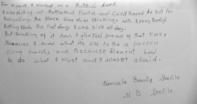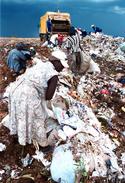Working the Dump

Old clothes, plastic shopping bags, rotting food, rotting chickens, vegetables, even sometimes a rotting dog — it was all piled up in the huge brown mountain of the dump, stretching as far as we could see. From far away, you could smell it. That first day, walking onto the dump with the other women, I felt sick all day, the smell was so bad.
For 10 years, from 1972 to 1982, we worked on that dump. Our job was to pick up broken bottles, cardboard and plastic and sell it all for recycling to an Indian man called Mr Faro, who was waiting at the edge of the dump. On a good day I made R30. I could buy bread, paraffin — it cost one penny — rice and mielie meal.
On other days we only made enough money to buy one small packet of rice. There was never any meat or vegetables, no money for that. If I didn't go to the dump, we had no food. Even on weekends, if I didn't go, we had nothing to eat. If you've got kids, they keep on needing food. Then you must go and buy bread and everything else all over again. Some of the women took food they found on the dump back to their families, but I could never do that, never.
Resourcefulness

One day I saw people picking up clothes on the dump, and I started doing that too. From then on, all my children wore clothes I found in the rubbish. We took them and washed them. When my granddaughter Nosanelisiwe was born, I even found a big bag full of cloth nappies on the dump, and washed them so we could use them for her.
Sometimes the white people put these things in a nice, clean black bag, and we found them like that blankets and even pillows and dishes, wrapped up nicely. I wonder why they threw those things away, because they were good things. We had very little, but I had a lot of clothes, the ones I found on the dump, and we dressed like ladies, you know. Working on the dump, we never fought, we were always laughing.
The one would say this thing, the other one another thing, and then we laughed. The one would pick up something, maybe some clothes, and say, 'Mrs Skefile, take this thing for you.' That was marvellous, even though the place was stinking. You have to be proud of yourself when you've got nothing, and you make use of what God gives you.
By Jo-Anne Smetherham